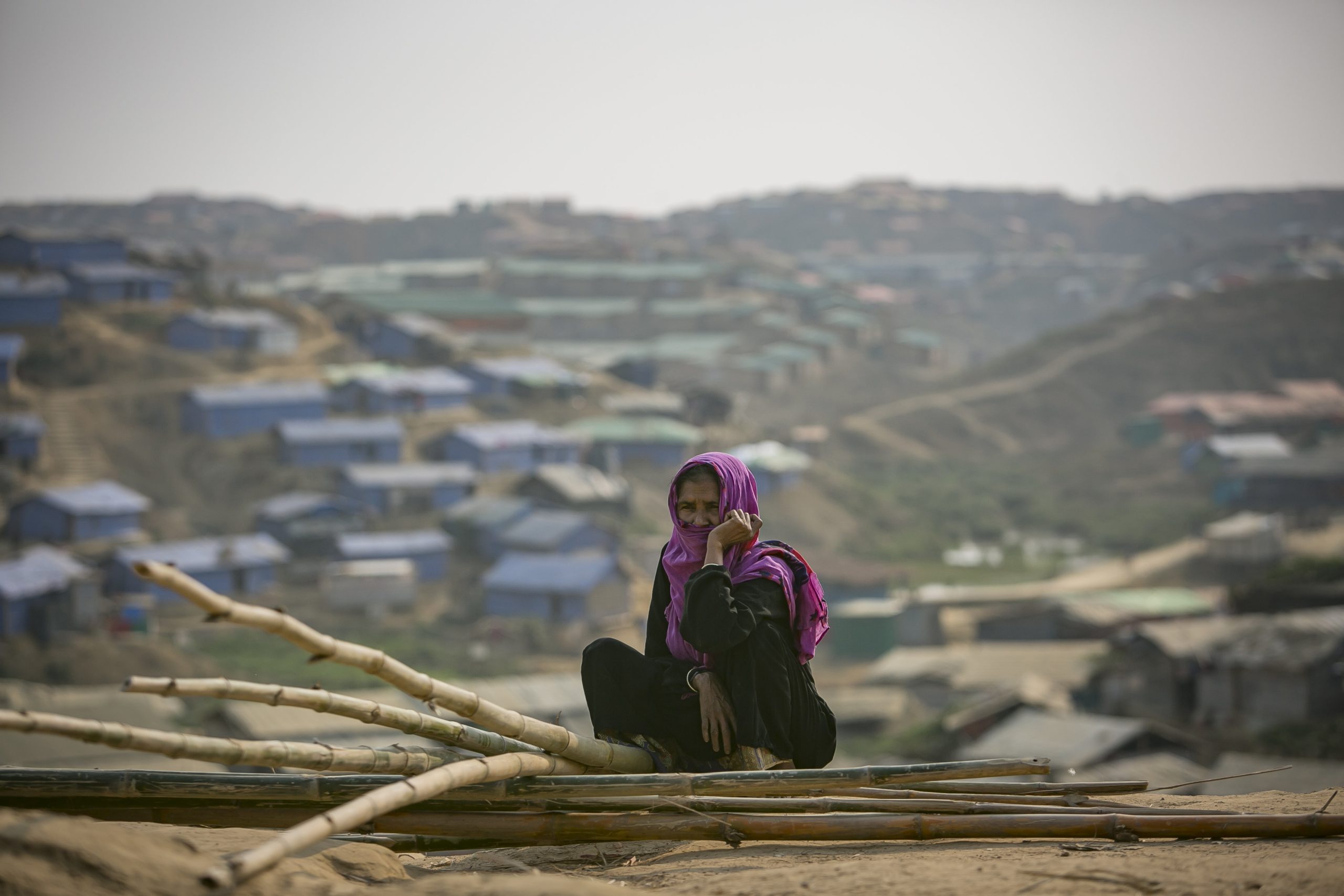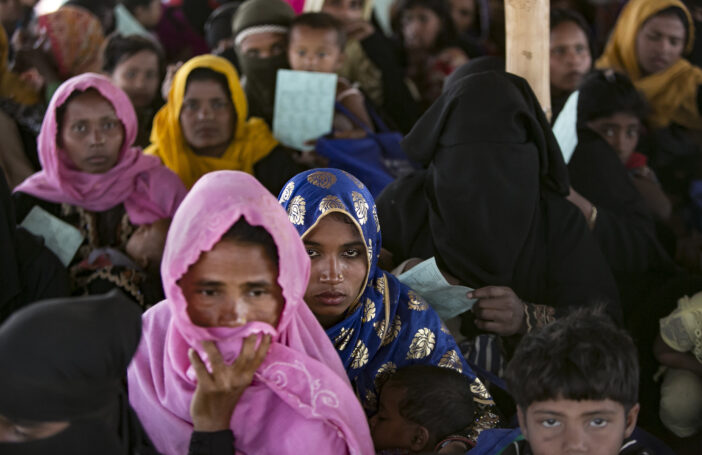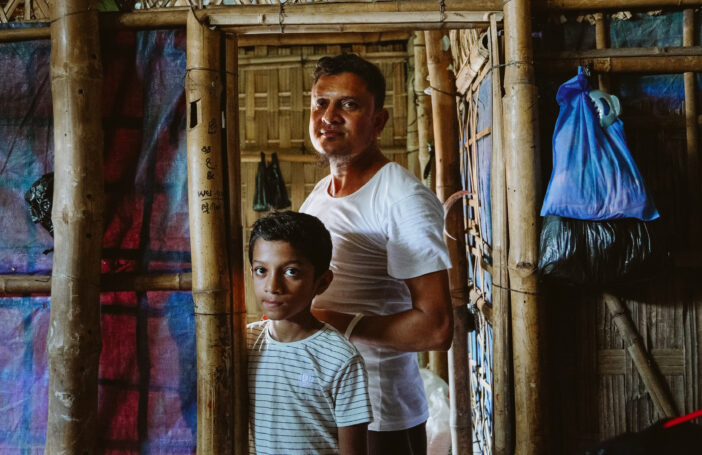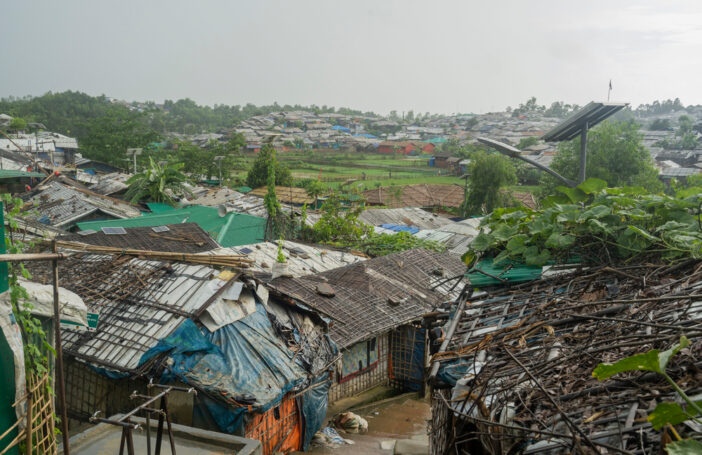A systematic campaign of ethnically fuelled violence and repression has forced nearly one million Muslim-majority Rohingya out of Myanmar and into refugee camps in neighbouring countries, primarily Bangladesh. Unable to return home and afforded no working rights in Bangladesh, the Rohingya are reliant upon international aid and support for survival.
The UN’s World Food Programme (WFP), a key source of food voucher assistance, has recently announced cuts to funding for the refugee camps in Bangladesh. Amidst rising global food costs, an increase in the number of geopolitical crises, and overstretched international humanitarian aid budgets, these cuts form part of a broader trend in declining support for protracted humanitarian crises in the global south.
Aid cuts to Rohingya refugees
The WFP cited a US$125 million shortfall in international donor funding as the key reason for its decision to cut food ration support for Rohingya refugees from US$12 to $10 per person per month in March, and a further $56 million shortfall leading to a reduction to $8 per person per month in June. For people who reside in refugee camps, barred from paid employment, WFP vouchers remain a key source of money to buy food. The allowance of US$12 per month was enough to supply around 13kg of rice, 500g of chickpeas, 250g of flour, five eggs and some other basic cooking supplies for one person for an entire month. A reduction to $8 per month reduces the vouchers to the equivalent of around $0.27 per day. Amidst record high food prices in Bangladesh, these cuts will stretch already limited food portions even further.
The UN Special Rapporteur on the situation of human rights in Myanmar, Tom Andrews, and other UN experts have called for a reversing of the funding cuts, calling it “a matter of life and death for Rohingya families”. The WFP has warned that these new cuts are likely to see rates of malnutrition increase amongst a population where more than one-third of children are stunted and underweight and 12% are suffering from acute malnutrition. Overall, the UN estimates that an additional US$876 million is required from donors to be able to ensure adequate access to food, shelter, health care, protection and other vital resources.
Where has the money gone?
One could reasonably conclude that the WFP cuts form part of a declining trend in global development assistance – however, in real terms international aid funding has actually never been higher. OECD has reported that foreign aid for humanitarian assistance and for refugee hosting has risen to an all-time high, up 13.6% from 2021-22. This increase in international funding has been in response to a growing number of global crises fuelled by the economic fallout from the COVID-19 pandemic, the impact of increasing climate emergencies, and new conflicts. The estimated number of refugees globally grew from 27.1 million in 2020 to over 32 million by the end of 2022. Almost three-quarters of these refugees come from Afghanistan, Myanmar, South Sudan, Syria and Ukraine, which have all seen worsening humanitarian crises in recent years due to conflicts and disasters.
Despite an increase in overall funding, the conflict in Ukraine and the exacerbation of other global crises has seen international aid stretched amongst a growing number of crises and reprioritised away from the global south. Funding from the US and major European donors for protracted crises in places like Afghanistan, Yemen and Bangladesh has seen a downturn, whereas aid commitments have been steadily increasing for Ukraine. The combination of growing humanitarian needs, the rising cost of basic goods like food and medicine, and the diversion of funds to Ukraine is widening the gap in required funds for global south crises.
Nowhere to go
The crisis in Bangladesh’s refugee settlements is compounded by restrictions on the Rohingya’s ability to build self-reliance capacity. Effectively made stateless by the Myanmar authorities, and with no legal rights to work in Bangladesh, the Rohingya are physically constrained to the boundaries of the camps and are entirely reliant on foreign aid for survival. Restrictions imposed by the Bangladeshi authorities constrain their ability to build self-reliant communities, limiting their movement, access to health care and education, and their ability to work and produce food for themselves.
International support is largely focused on providing immediate relief and does not address long-term development needs. As a key responder on the ground, Médecins Sans Frontières has found that the international communities’ policy of containment perpetuates existing issues and is highly detrimental to the Rohingya’s sense of hope for the future. UNHCR has called for more durable solutions from the international community which include increasing the resettlement of Rohingya refugees in third countries.
As a key regional power, Australia has contributed to this containment policy despite calls from Bangladeshi authorities and international advocacy groups to increase their resettlement of refugees and to increase support for resettlement in other countries. As a measure of comparison, Australia has granted 470 humanitarian visas to Rohingya refugees since 2008, whereas more than 10,000 humanitarian visas have been granted to Ukrainian nationals since February 2022.
The Ukraine example should not be taken as a criticism of humanitarian support for Ukrainians, but as a template for response to all humanitarian crises globally. When regional powers like Australia refocus humanitarian assistance away from protracted global south crises, others in the international community are empowered to do the same.
The international community cannot forget about the Rohingya crisis. It must allocate funds for the provision of essential humanitarian services, while also increasing efforts to provide a safe pathway for the resettlement of more Rohingya refugees and prioritise long-term solutions to reduce suffering.
This blog was first published by the Humanitarian Advisory Group. It has been edited with some minor updates.




